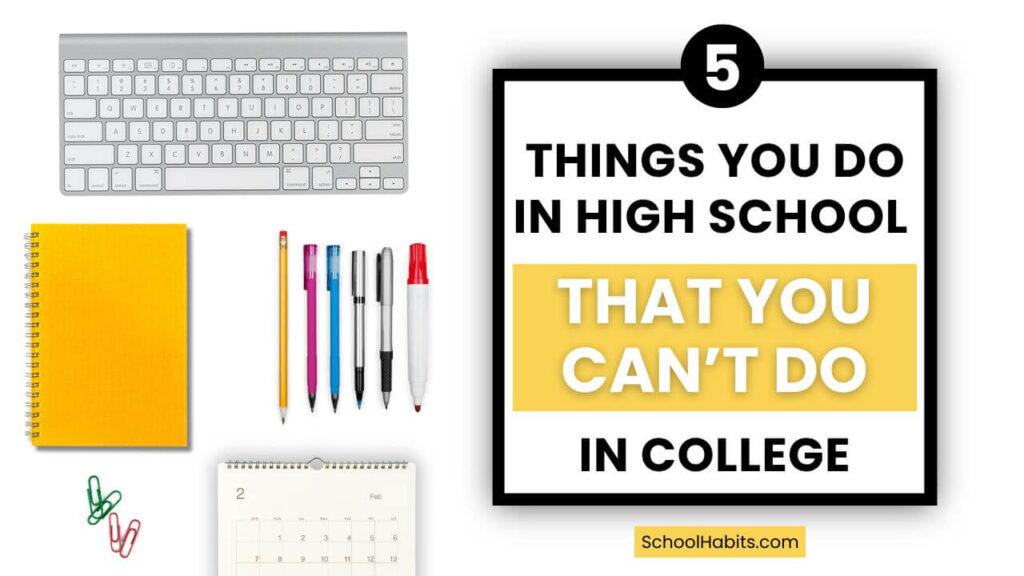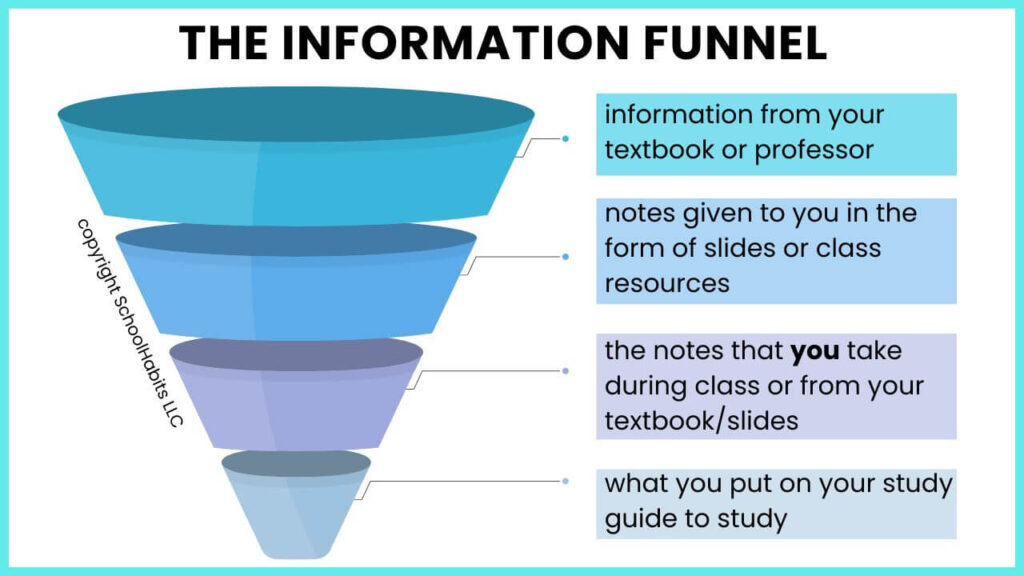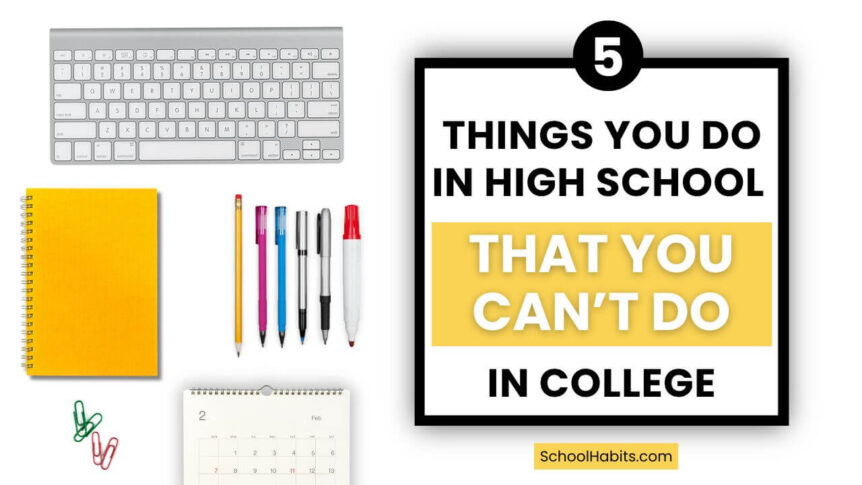
By Katie Azevedo, M.Ed.
I don’t need to tell you how different college is from high school. If you’re in college, you already know this. If you’re in high school, I’m sure you’ve already heard that everything changes after high school graduation.
The most obvious differences between high school and college, at least for some students, include moving out of the home, living in a dorm, being responsible for your own meals and laundry, and having no parent reminding you about all the little things – including going to class.
But there’s more.
In this blog post, I’m sharing five things you do in high school that you can’t do in college. The list below is a mixture of my 20 years of teaching high school and college students as well as input from my own college-age clients.
What to Read Next: 25 Things All College Freshmen Need to Know
5 Things You Do in High School That You Can’t Do in College
Knowing that certain high school habits don’t work in college is a good first step. The next step is to up-level your high school skills to college skills by joining SchoolHabits University. Obviously.
1. Expecting the Professor to Teach You Everything in Class
Yes, it’s your professor’s job to teach you. But in college, so much of the learning happens OUTSIDE the classroom.
While you’ll learn a good chunk of content during your lecture classes, the college curriculum is often too big to fit into a class you only have a few times a week.
What does that mean? That means you have to learn the remaining material on your own, outside of class.
How do you learn the material on your own?
By doing the assigned readings, completing your assignments, and not skipping the homework that “nobody’s checking.”
In college, you’ll get a lot of readings that you could ”technically” skip, but if you do, you’ll fail the assessments … which means don’t skip your readings. Your readings and assignments ARE the lesson. If your professor teaches 60% of the content, then 40% comes from the homework and readings.
You also need to know how to use your resources. Professors often post videos, additional resources, and practice questions to your learning management system (LMS). While these aren’t always posted as “assignments,” they’re there to help you learn.
On the other hand, if a high school teacher posts something to your LMS, they tell you about it, remind you about it, and give you time in class to complete it. College? No way.
In summary, in high school, you can expect to be taught the majority of content during class, while the assignments simply reinforce that material. But in college, only a part of the instruction comes during class, while the point of assignments is to teach you the remaining material.
2. Not Taking Notes or Depending On Teacher Slides
Successful students take notes in high school. But if somehow you made it through high school without a solid note-taking system, that has to change in college.
Many high school students also depend on the notes and slides their teachers post in their learning management system. While these are helpful materials, they don’t count as notes.
Remember, notes serve a purpose. In fact, they serve two purposes:
- to help you understand what you’re taking notes on
- to serve as a resource you can study from
In this video, I teach you how to take notes that are easy to study from. Trust me when I tell you that this note-taking method saves you so much time in the long run.
Also, college classes are DENSE. There is A LOT of material to cover. Your professors‘ slides will be jam-packed with content that isn’t yet distilled into a version that’s easy to learn from.
That’s where your own notes come in. Your notes take ALL the information on the slides or delivered during class and reduce it into a version that’s easier to understand.
The image below illustrates this concept better.

Also, if you’re the type of student who doesn’t take notes in high school because “you remember it all,” that’s something you can’t do in college.
In high school, your teachers return to the same material over and over again, day after day. This increases how much you remember the content. But in college, your professor delivers material once and then moves on. If you don’t capture that material in the form of notes, you won’t have anything to return to when you need to study.
3. Waiting Until the Night Before a Test to Study
Waiting until the night before a test to study is not something you should be doing — ever — no matter what level of student you are.
The process of turning new information into knowledge involves neurochemistry and time — two things that we can’t rush no matter how badly we want to.
I always say that for a basic test, studying at least 5-10 days in advance gives you the best results — using spaced repetition, of course. But in college, that timespan is even more essential than in high school.
As I wrote earlier, high school teachers return to the same content over and over again, which in itself is a form of spaced repetition built into the school day. You can’t use that as your only form of studying, of course, but it’s a start.
In college, however, you learn the material once and then quickly move on to the next thing. There’s no returning to the same material over and over again. Therefore, you need to review the material on your own every few days.
Students who take their high school study habits with them to college are often rudely awakened after the first one or two exams. That’s when they realize that they actually have to KNOW the material, and not just memorize it.
Here’s exactly how to go from memorization to learning.
4. Expecting Credit for Late Work
Many high school teachers have lenient late-work policies. For example, you may have high school teachers who give credit for late assignments as long as you turn them in before the quarter closes. This does not happen in college.
Unless you have a special situation that you have communicated to your professors, college deadlines are hard deadlines.
(Special situations can include excused absences due to illness or emergencies, or accommodations for learning disabilities.)
But even in those situations, it’s on you to communicate early and clearly. Professors aren’t going to chase you down to ask why you haven’t submitted something — they’ll just mark it as late or incomplete and move on. If you’re struggling to meet a deadline, reach out to your professor as soon as possible. Some professors may give an extension, but only if you’ve communicated your situation in advance.
It’s also important to understand that late policies can vary by professor. While one might give a small penalty for late work, others might give no credit at all, even if it’s only five minutes past the deadline. And in many cases, assignments are submitted electronically, so when the portal closes, it’s closed.
In summary, the casual flexibility around late assignments in high school isn’t something you can count on in college. Deadlines mean deadlines, and meeting them is part of managing your time and workload as a student. Missing due dates in college doesn’t just impact your grade — it can also affect your relationship with your professor, which matters later when you need a recommendation letter or additional support.
5. Expecting to be Given a Study Guide
Many high school teachers give out study guides before tests. These study guides are often very robust and may even include exact questions that will appear on the exam. While this can make studying easier in high school, it’s not something you can rely on in college.
In college, professors expect you to figure out on your own what to study. If you’re lucky, they may give you a general list of topics, but usually they’ll say something like, “Everything we’ve covered so far is fair game for the exam.” This means you’re responsible for knowing what “everything we’ve covered” includes.
How do you handle this shift? By creating your own study guide. From your notes, assigned readings, and materials posted by the professor, compile key concepts, terms, and practice problems you think are most important.
Your study guide should be a complete list of all topics and questions you’ll likely see on the test, as well as the definitions, explanations and answers. From this study guide, you’ll make active recall study resources.
Creating your own study guide helps you prepare for the test and forces you to think about the material on a deeper level. This is partly why professors don’t hand out study guides — because the act of identifying what’s important is part of learning. And at the college level, that’s something that you should be able to do.
Final Notes About Things You Do in High School That You Can’t Do in College
If you’re a high school student reading this and feeling overwhelmed by the idea that “everything changes” in college, I get it. Change can be intimidating, especially when the strategies and systems you’ve relied on for years suddenly don’t work anymore. (Hopefully, you’re not doing any of these 10 “Good” School Habits That Seem Smart But Are Actually Bad.)
But here’s the good news: by the time you transition to college, you’ll have matured and gained a better understanding of what it means to be an independent learner.
Some changes will happen gradually over your first year of college, but others — like the five things you do in high school that you can’t do in college — might take you by surprise. That’s exactly why I wrote this post: to help you prepare for and avoid those surprises.
Of course, it’s also possible that these five habits don’t apply to you because you already have college-level skills. If that’s the case, you’re amazing! If not, the skills I teach inside SchoolHabits University can help you bridge the gap. This course is designed to prepare high school students for college in the simplest and most effective way possible. If you haven’t checked out SchoolHabits University yet, it’s time.
Related Resources:

